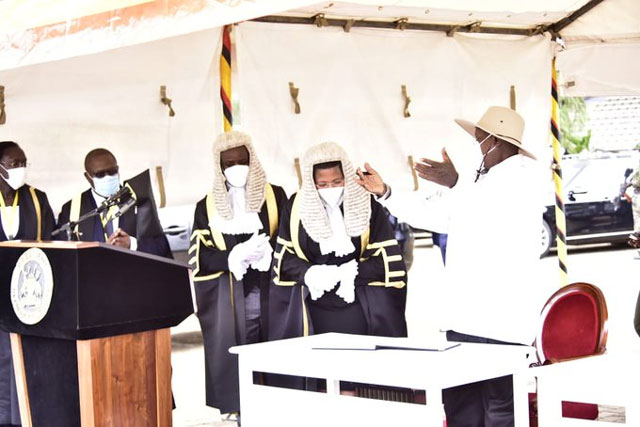
✳ Oulanyah junior sworn in
✳ President starts by quoting the bible, Mathew 7 ‘house built on rock’
✳ Uganda passes figure of $1036 for lower middle income status
✳ Uganda to import 600 solar powered water pumps in one year
✳ Uganda to continue efforts to process coffee locally
✳ Coffee, iron ore, oil will be processed in Uganda
Kampala, Uganda | THE INDEPENDENT | President Yoweri Museveni has said Uganda will process coffee, oil and iron ore locally in order to improve on revenue the country gets, instead of exporting the commodities for peanuts.
He promised to engage parliament that is opposing government’s plan to process coffee in a deal with Uganda Vinci Coffee Company. The president said he is the one who interested the company in coffee, after he realised how much the country was losing from exporting raw coffee.
“The continued export of raw materials in Africa is the new form of slavery,” Museveni said.
“Right from 1986, I started the struggle to add value to our coffee because our cadres who were deployed there told me of the value differentials between our coffee sold as beans and what it would get when processed as soluble coffee, or any other type of final coffee, to be consumed.”
Museveni was today delivering the State of the Nation Address to Parliament at Kololo ceremonial ground.
He highlighted several successes and failures of the past year, including the failed fertilizer factory in Sukulu, Tororo.
“So many people took bribes from our Chinese friend of Sukulu fertilizer factory, I couldn’t arrest them because I didn’t have enough facts. But I know them, I know who took which bribe and how they messed up that Chinese man,” Museveni remarked.
The Speaker Anitah Among started by making her communication to mark the official opening of the 2nd Session of the 11th Parliament. This was after the swearing in of new Member of Parliament Andrew Ojok Oulanyah, who replaced his dad, former Speaker Jacob Oulanyah who passed away recently.
STATE of the Nation Address 2022 (CLICK HERE)
 The Independent Uganda: You get the Truth we Pay the Price
The Independent Uganda: You get the Truth we Pay the Price




Commodity prices are still high. How will the government minimise prices?